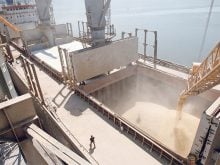WINNIPEG, Manitoba, Aug 10 (Reuters) – Canadian officials are in Beijing this week to try to convince China to back off a plan to toughen its standard for Canada’s canola shipments, which threatens to stalled $2 billion in trade, government and industry officials said on Wednesday.
China’s quarantine authority AQSIQ told Ottawa in February that it would impose a stricter inspection standard for canola shipments starting April 1. It later postponed the move to Sept. 1. Canada is the world’s biggest exporter of canola, used mainly to produce vegetable oil.
AQSIQ and other Chinese officials are meeting through Friday with the Canadian Food Inspection Agency (CFIA), as well as Canada’s agriculture and trade departments, said Patti Miller, president of industry group Canola Council of Canada, which is also at the discussions.
Read Also

VIDEO: What tech makes your combine tick during harvest season?
Greg Berg with Glacier FarmMedia speaks with product specialists with Case IH, New Holland and John Deere about harvest technology features on their combines at Canada’s Outdoor Farm Show.
“It’s a pretty difficult time right now,” Miller said in an interview from Beijing. “Both sides have been very open in expressing their desire to find a resolution, but there is a significant difference in opinion.”
Canadian canola shipments for delivery in China after Sept. 1 have stopped, she said.
China has for years raised concerns about blackleg disease spreading from Canadian canola into Chinese crops of rapeseed. Traders have suggested that China’s real reason for a higher standard is that its domestic rapeseed oil stocks are high.
China’s new standard would allow no more than one percent foreign material, such as straw, per shipment, compared with the current maximum of 2.5 percent. The tougher standard would raise cleaning costs and risk, exporters have said.
At stake for Canada is the potential loss of its biggest canola market for exporters including Richardson International, Viterra Inc. and Cargill Ltd., just as farmers harvest a big crop.
For China, the dispute doesn’t help its push for a free trade deal with Canada.
Guy Gallant, spokesperson for Canadian Agriculture Minister Lawrence MacAulay, said there are no plans for either MacAulay or Trade Minister Chrystia Freeland to join the talks.
“There’s an expectation from all that we meet in the middle here,” Gallant said from Ottawa.
Whether Canada would retaliate if China follows through is a “hypothetical question,” Gallant said. Both countries are members of the World Trade Organization.
The Chinese Embassy in Ottawa, CFIA and a spokesperson for Freeland could not be immediately reached for comment.















